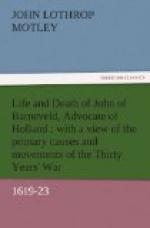“Monday, 13th May 1619. To-day was executed with the sword here in the Hague, on a scaffold thereto erected in the Binnenhof before the steps of the great hall, Mr. John of Barneveld, in his life Knight, Lord of Berkel, Rodenrys, &c., Advocate of Holland and West Friesland, for reasons expressed in the sentence and otherwise, with confiscation of his property, after he had served the State thirty-three years two months and five days since 8th March 1586.; a man of great activity, business, memory, and wisdom—yes, extraordinary in every respect. He that stands let him see that he does not fall, and may God be merciful to his soul. Amen?”
A year later-on application made by the widow and children of the deceased to compound for the confiscation of his property by payment of a certain sum, eighty florins or a similar trifle, according to an ancient privilege of the order of nobility—the question was raised whether he had been guilty of high-treason, as he had not been sentenced for such a crime, and as it was only in case of sentence for lese-majesty that this composition was disallowed. It was deemed proper therefore to ask the court for what crime the prisoner had been condemned. Certainly a more sarcastic question could not have been asked. But the court had ceased to exist. The commission had done its work and was dissolved. Some of its members were dead. Letters however were addressed by the States-General to the individual commissioners requesting them to assemble at the Hague for the purpose of stating whether it was because the prisoners had committed lese-majesty that their property had been confiscated. They never assembled. Some of them were perhaps ignorant of the exact nature of that crime. Several of them did not understand the words. Twelve of them, among whom were a few jurists, sent written answers to the questions proposed. The question was, “Did you confiscate the property because the crime was lese-majesty?” The reply was, “The crime was lese-majesty, although not so stated in the sentence, because we confiscated the property.” In one of these remarkable documents this was stated to be “the unanimous opinion of almost all the judges.”
The point was referred to the commissioners, some of whom attended the court of the Hague in person, while others sent written opinions. All agreed that the criminal had committed high-treason because otherwise his property would not have been confiscated.
A more wonderful example of the argument in a circle was never heard of. Moreover it is difficult to understand by what right the high commission, which had been dissolved a year before, after having completed its work, could be deemed competent to emit afterwards a judicial decision. But the fact is curious as giving one more proof of the irregular, unphilosophical, and inequitable nature of these famous proceedings.




